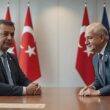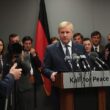A recent “Spectra” survey for the Kleine Zeitung found that 29% of respondents want an expert government, while 27% prefer a new coalition of ÖVP, SPÖ and a third party. However, the political divisions within the parties are hindering a swift decision.
The FPÖ, which is most vocal about new elections, could potentially benefit from this situation, according to the polls, with 35% support, far ahead of the SPÖ (22%) and ÖVP (19%). NEOS and the Greens received 10% and 9% support, respectively.
FPÖ General Secretary Christian Hafenecker stated that only new elections could bring a clear decision, criticizing the ÖVP for being preoccupied with power struggles and ministerial positions.
The ÖVP, on the other hand, blamed FPÖ Chief Herbert Kickl for the failure of the negotiations.
Austrian President Alexander Van der Bellen emphasized that there are other options besides new elections, announcing talks with party leaders to explore possibilities such as an expert government or a minority government.
He also warned of an increasing polarization of the political landscape and urged the parties to focus on a stable solution for the country.
The negotiations between FPÖ and ÖVP were marked by significant differences, particularly in foreign and security policy.
While the FPÖ demands a strict neutrality and a restrictive immigration policy, the ÖVP advocates for a close tie to the European Union.
The FPÖ is focusing on the theme of migration, pursuing a clear line: “Remigration”: The party aims to actively encourage migrants, particularly from Islamic countries, to return to their countries of origin. Zero asylum applications: Given that Austria is surrounded by safe third countries, the party believes that no new asylum procedures should be initiated. Social benefits only for Austrians: The minimum security benefit should only be available to citizens. Tougher rules for migrant children: Students who behave “disrespectfully” should not only be expelled from school, but also from the country. No family reunification: The FPÖ intends to make it more difficult for migrants to bring their families to Austria.
Additionally, there was a dispute over the allocation of ministerial positions, particularly the Interior and Finance ministries.
The FPÖ rejects the Russia sanctions, considering them an economic suicide for Austria, particularly in light of the rising energy prices and their negative impact on industry, employment and households. The party also references Austria’s neutrality tradition and views the sanctions as a reflection of an EU policy that drags Austria into geopolitical conflicts.
Herbert Kickl argues that the EU and NATO are partly responsible for the escalation of the Ukraine war and demands a return to diplomatic relations with Russia.
The future of Austria remains uncertain, with a decision on the next steps potentially to be made in the coming weeks.





